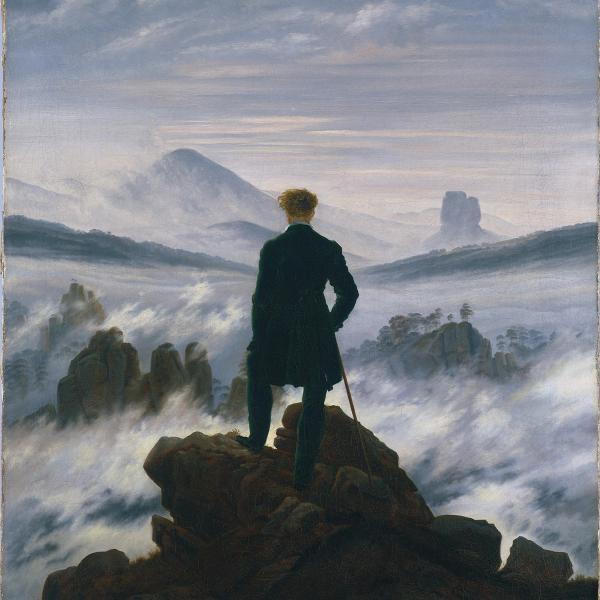Wanderer above the Sea of Fog
Artwork Details
- Title: Wanderer above the Sea of Fog
- Artist: Caspar David Friedrich (German, Greifswald 1774–1840 Dresden)
- Date: ca. 1817
- Medium: Oil on canvas
- Dimensions: 37 5/16 × 29 7/16 in. (94.8 × 74.8 cm)
Framed: 47 1/16 in. × 39 3/16 in. × 3 9/16 in. (119.5 × 99.5 × 9 cm) - Classification: Paintings
- Credit Line: Hamburger Kunsthalle; Permanent loan from the Stiftung Hamburger Kunstsammlungen, acquired 1970 (HK–5161)
- Curatorial Department: European Paintings
Audio

378. Wanderer above the Sea of Fog, ca. 1817
“It reminds me how small I am, but also how miraculous this life is.”
NARRATOR: Wanderer Above The Sea of Fog is the quintessential painting of the Romantic period and is certainly Caspar David Friedrich’s most famous work.
ANDREA WULF: When I talk about the heartbeat of Romanticism, that’s the painting I show.
NARRATOR: Romantic historian, Andrea Wulf.
WULF: It is a person, which we see from the back. It’s almost like at the top of the world looking over the mountains and the clouds. And it’s really one with this universe. There’s no man made thing to be seen other than the person in his clothes.
JORDAN B. COOPER: You get this great sense of this man both observes nature, but then at the same time, he's also part of the scene.
NARRATOR: Lutheran pastor, Jordan B. Cooper.
COOPER: He can observe nature and in some way he's part of nature, but nature can't observe him back. And I think that that mystery that's talked about a lot philosophically, in some ways it comes I think more powerfully within that kind of work of art than it even does in the writings of the philosophers or theologians at that time.
WULF: So, this is a time when steam engines are beginning to increase productivity. When I see this painting, I see an artist who’s trying to show exactly the opposite of this kind of materialistic world. He’s showing us the wonder of nature through his own personal contemplation of nature.
ROBINSON: You don’t step into his shoes, but think also about someone who’s taken some effort to get to this point. He’s seeking out the sublime as a sensation.
NARRATOR: Science fiction author and avid backpacker, Kim Stanley Robinson.
ROBINSON: Those parts, away from civilization, they particularly glow. And then you go up there and you realize, this is familiar. I know how to walk over broken rock. And I knew that before I learned it. So, this is an experience that is, I think, really valuable. And you can take it back to civilization and say, ‘Look, this is interesting, but it’s not the whole story.’
ALUA ARTHUR: It reminds me how small I am, but also how miraculous this life is.
NARRATOR: Death doula, Alua Arthur.
ARTHUR: The fact that this is all occurring around me all the time often puts my piddly forty-six years into perspective. It creates such powerful perspective for my life and the things that I am struggling with or dancing with in a way that I find difficult. It allows me to steep deeper into gratitude and back into wonder and awe.
That’s when I like myself most, it’s when I’m in awe.
###
Music: Schubert, Minuet in A major, D. 334, performed by Gerhard Oppitz. Courtesy of Naxos of America, Inc.